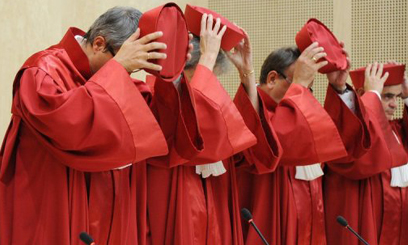
Judges of the German Constitutional Court prepare to issue their ruling on the legality of the eurozone’s bailout fund/AFP
Germany, Sept 13 – The eurozone took a major step Wednesday towards solving its debt crisis as Germany’s top court cleared a new bailout pot, a ruling Angela Merkel hailed as a “good day for Europe”.
In a landmark ruling, the Constitutional Court dismissed a raft of legal challenges aimed at preventing German President Joachim Gauck from signing two crucial crisis-fighting tools into law.
Delivering a judgement that has far-reaching implications for the euro’s future, the eight scarlet-robed judges of the Bundesverfassungsgericht said Gauck could sign the European Stability Mechanism (ESM) and fiscal pact into law.
“This is a good day for Germany, this is a good day for Europe,” the chancellor told parliament.
“Germany is once again sending a strong message to Europe and beyond,” Merkel said. “Germany is decisively living up to its responsibilities as Europe’s biggest economy and a reliable partner.”
While the eurozone crisis would not be beaten immediately, she said Europe had made “initial progress” towards overcoming the difficulties that have at times threatened the very existence of the 17-nation bloc.
The ruling clears the path for the 500-billion-euro ($620-billion) ESM, designed to replace the EU’s current bailout fund for stricken members, the EFSF.
It should have been in place by July 1 but it needed Germany’s share of the rescue money to function and had thus been on ice pending the court ruling.
Italian Prime Minister Mario Monti said the judgement was “excellent news.”
The ruling came on a day of high risks for the euro, which has enjoyed calmer times in recent weeks, as an anti-austerity party is seen likely to score big gains in Dutch elections and plans towards a eurozone banking union were unveiled.
European Commission President Jose Manuel Barroso called for a quantum leap towards a kind of United States of Europe, a move he said would require a new treaty.
Markets and analysts also welcomed the court ruling since a rejection of the ESM would have triggered a fresh bout of financial chaos and a new political crisis.
European markets were up after the decision, the euro strengthened and Spanish and Italian borrowing costs dropped.
ESM Holger Schmieding, an analyst at Berenberg Bank, hailed “another big step towards defusing the euro crisis” but warned against over-excitement.
“The euro crisis is not over yet. It comes in waves. Grave risks are still ahead,” he said, noting a “30 percent risk” that Greece may yet be forced out of the eurozone.
Germany’s media also breathed a sigh of relief. “The euro rescue can begin!” top-selling daily Bild wrote in its online edition.
The court however attached some conditions to its green light.
Reading the 85-page ruling, Chief Justice Andreas Vosskuhle specified that any financial burden for Germany arising from the ESM is strictly limited to its share of the fund’s capital or 190 billion euros ($244 billion).
If the burden were to increase beyond that amount, it could only be done with the German parliament’s express approval and both upper and lower houses must be kept fully informed, the court said.
The judges also ruled that Germany must ensure a de-facto opt-out clause if it felt its interests were not being considered.
“The Federal Republic of Germany must make it clear that it does not want to be bound to the ESM Treaty as a whole if any reservations it might have should prove ineffectual,” Vosskuhle said.
Nevertheless, Vosskuhle stressed: “Our examination has shown that the laws with a high probability do not infringe upon the German constitution. That is why we have rejected the injunctions.”
President Gauck said he would take a decision on signing the laws “as quickly as possible” but gave no fixed date.
Eurogroup head Jean-Claude Juncker announced that the board of the ESM would hold its first meeting on October 8. German Finance Minister Wolfgang Schaeuble said the fund could be ready “within weeks.”
Technically, the court ruled solely on whether to grant applications for temporary injunctions by eurosceptic politicians and groupings and delay ratification of both the ESM or the fiscal pact.
The court will decide only at a later date whether the two are compatible with the German constitution, and that ruling could take several months yet.
Nevertheless, the court did provide some strong guidance as what that final ruling might look like.
The plaintiffs included the far-left Die Linke party, an initiative called More Democracy grouping 37,000 citizens and an outspoken critic from the Bavarian sister party of Merkel’s conservatives, Peter Gauweiler.
They had argued the ESM and the fiscal pact were incompatible with Germany’s Basic Law because they irreversibly delegate national sovereignty to the European level and interfere with parliament’s right to draw up budgets.
But the court dismissed such arguments as “unfounded”.


































